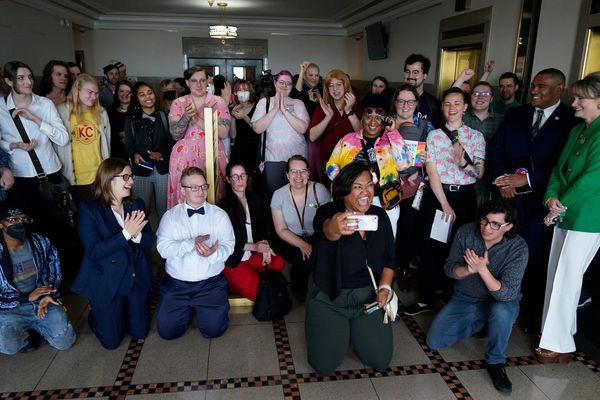WASHINGTON _ The average American has received more than 100 robocalls already this year: annoying and unwanted calls, scammers looking to exploit vulnerable populations, and all manner of alerts _ some important and others simply fake.
Twelve of the nation's largest phone companies, including AT&T, Sprint, T-Mobile, Verizon, Charter and Comcast, will implement initiatives to prevent robocalls and encourage more enforcement as part of an agreement with the nation's 51 attorneys general.
North Carolina AG Josh Stein led the group along with attorneys general in New Hampshire and Indiana. New Hampshire AG Gordon MacDonald and Arkansas AG Leslie Rutledge announced the deal Thursday afternoon in Washington, D.C.
"Robocalls are a scourge. At best, annoying. At worse, scamming people out of their hard-earned money," Stein said in a statement. "By signing on to these principles, industry leaders are taking new steps to keep your phone from ringing with unwanted calls."
All three attorneys general said robocalls are the top issue they hear about from residents, including ones who tell stories of being scammed out of their life savings. Stein said his office put a petition about the issue on its website and tens of thousands of people signed it.
"It is visceral," he told McClatchy in an interview.
"I hope one day we will be able to push a button every time they call and charge them a fee to be paid toward our phone bill," said Jim Hood, Mississippi's attorney general, in a statement.
The other phone companies involved in the agreement are Bandwidth, CenturyLink, Consolidated, Frontier, US Cellular and Winstream. Other providers are encouraged to join the agreement, which is non-binding.
In July, North Carolinians received 166.4 million robocalls, an average of 19.6 per person, according to the call-blocking company YouMail. In 2018, Americans dealt with nearly 48 billion robocalls, according to the company.
"Beyond the scams and the spam, robocalls are having other damaging impacts," MacDonald said, recounting the story of a New Hampshire mother on a liver donor waiting list who didn't answer a call because she didn't recognize the number. "It's changing the way we engage with our telephones. We don't answer the phone. There can be consequences for legitimate calls that are missed."
To prevent illegal robocalls, the phone companies will implement call-blocking technology at no cost to customers, allow customers to access free, easy-to-use call blocking and labeling tools, implement technology to authenticate calls are coming from a valid source and monitor networks for robocall traffic.
To help with enforcement, the companies agreed to investigate and take action against suspicious callers and trace the origins of illegal robocalls.
"The principles offer a comprehensive set of best practices that recognizes that no single action or technology is sufficient to curb the scourge of illegal and unwanted robocalls," Henning Schulzrinne, a professor of computer science and electrical engineering at Columbia University, said in a statement.
Patrick Halley of USTelecom, which represents telecommunications companies, said the providers see a benefit in working with the government to weed out these calls, saying provider networks are being abused and customers are not picking up legitimate calls.
"We do this because our customers demand it," Halley said at the announcement event in D.C. "If we reduce the ability of criminals, it increases the confidence of consumers. People aren't answering calls anymore. That's not good for us, that's not good for consumers."
It's not just state attorneys generals that are hearing about robocalls. North Carolina passed a law this year that would fine telemarketers for spoofing phone numbers. Both chambers of Congress passed legislation to deal with the issue in near unanimous votes earlier this summer.
The Senate passed the Telephone Robocall Abuse Criminal Enforcement and Deterrence Act 97-1 in May to stop robocalls, while the House passed the Stopping Bad Robocalls Act 429-3 in July, McClatchy reported earlier this month.
The legislation includes some of the same principles outlined in the agreement, notably greater authentication efforts.
"While we, as states, want Congress to take action and want the FCC to be a strong regulator, we cannot wait for them to solve this problem," Stein said.
Stein said he wrote North Carolina's "do not call" law while heading the state's consumer protection division under then-AG Roy Cooper. He said the list worked to stop telemarketing from legitimate companies and corporations. But those spamming phones today are "complete criminals who do not care about following the law," he said.
"We had a number of years of peace and quiet," Stein said. "I've taken it personally that they've flouted what I thought was a really big accomplishment."
He said he has been working on this agreement since 2017.
"We want to shine a bright light on this sordid industry that exists in the darkness," he said.
The U.S. Chamber of Commerce, in an April 29 letter to a House subcommittee considering the legislation, argued that some types of robocalls or automated text messages should be exempt.
"Fraud alerts, data breach notifications, reminders to renew prescriptions or schedule a visit to the doctor, notifications of power outages, and automobile recall notices are consumer-benefiting calls that must be placed immediately to be of value to the recipient. It is critical that these calls and text messages be completed," they wrote in the letter signed by associations representing bankers, restaurants, retailers and health-care administrators.
Stein and others said the technology exists to separate the legitimate calls and reminders from those that are illegal and fake.
People who receive illegal robocalls should contact the FCC or their state attorney general, Stein said.






